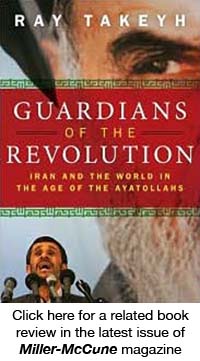In the ongoing tension between the Islamic and Western worlds, religious fundamentalism is widely viewed as an obstacle to compromise — or even rational discussion. The contentious election in Iran suggested as much, in that the anti-Western president Mahmoud Ahmadinejad’s disputed victory was attributed to support by the hard-line clergy and the “pious poor.”
But new research conducted in both the U.S. and Iran suggests religious hard-liners can be softened — if one’s appeal is couched in the compassionate beliefs of their faiths.
In “Does Peace Have a Prayer?”, soon to be published in the Journal of Experimental Social Psychology, Zachary Rothschild of the University of Kansas, Tom Pyszcznski of the University of Colorado at Colorado Springs and Abdolhossein Adbollahi of Iran’s Azad University — Zarand Branch address the essential paradox of fundamentalism, which Pyszcznski defines as “the disconnect between the peaceful teachings of virtually all major world religions and the attitude and violent actions of fundamentalists.”
For religious extremists, their deeply held belief system is “the central source of all that is viewed as right and good in life,” he notes. “But when they encounter those who don’t share their beliefs, sometimes the certitude of their faith leads them to forget to apply the compassionate values that are central teachings of their religions.”

This fierce, morally blinding certainty, which Pyszczynski calls “the assumption that an inerrant text demands complete unquestioning submission,” often leads to prejudicial, negative attitudes towards outsiders and, in extreme cases, support for violence.
Past studies have found that reminders of one’s mortality tend to lead people to affirm their faith and values, and respond more negatively to those who do not share their beliefs. Reminders of death have been shown to increase Americans’ support for the use of military might to combat terrorism, Israelis’ belief in the legitimacy of using violence against Palestinians, and Iranians’ support for martyrdom missions against Americans.
In an attempt to determine if reminding fundamentalists of the compassionate teachings of their religion would reverse this effect of fear on support for violence, the researchers conducted three studies: Two in the U.S. and one in Iran. In each case, participants were initially asked to think and write a bit about their own deaths.
In the two studies conducted in the U.S., participants were then reminded of the value of compassion. Some were presented with secular statements such as “you should always try to treat others the way that you would like to be treated,” while others were presented identical thoughts in explicitly Biblical terms. Others were presented religious quotes that were unrelated to compassion, such as “build your house on a solid foundation,” while still others were presented neutral quotes from non-religious sources.
All were then asked their views of using deadly military force, including chemical and nuclear weapons, to defend American interests.
Participants rated as strong fundamentalists “responded to the compassionate Biblical values with reduced support for violence, but did not respond this way to (the neutral quotes or to) the same compassionate values presented in secular form,” the researchers conclude. “It appears that it is the combination of a compassionate message with religious authority that leads fundamentalists to respond to existential threat with less-hostile attitudes toward out-groups or perceived enemies.”
A closely related study conducted among Iranian college students (all of whom were Shiite Muslim) produced strikingly similar results. Thoughts of their own mortality, combined with compassionate values expressed in secular terms, “led participants to become aggressively anti-Western.” But when the same values were couched in verses from the Koran, the researchers found “a significant decrease in anti-Western sentiments.”
“Although reminders of death have been shown to be capable of increasing anti-Western attitudes and support for martyrdom missions, the present findings show that such increased hostility and support for violence is not an inevitable response to existential threat, and that compassionate religious values can play an important role in redirecting individuals toward more peaceful means of coping in both Christian and Muslim cultures,” the researchers conclude.
To Pyszczynski, these findings suggest President Obama was wise to emphasize his respect for Islam — and his understanding that the Koran preaches peace — in his Cairo speech to the Muslim world. Indeed, the studies suggest the use of such language may make a huge difference in how such a message of cooperation is received.
“Our research shows that it is possible to increase support for peace by appealing to the values that many people center their lives around,” he said in a follow-up message. “If we’re going to find peace and solve the many problems we now face as human beings, we need to find a way to communicate with all types of people — fundamentalists included. They’re too important and powerful to ignore, and they have the same rights to their beliefs that we have to ours.”
Sign up for our free e-newsletter.
Are you on Facebook? Become our fan.
Follow us on Twitter.




